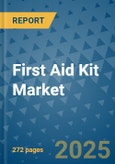First aid kits, once basic household necessities, are now essential components across various sectors, including corporate offices, healthcare facilities, sports academies, and even public transport systems. With the growing emphasis on emergency preparedness and health infrastructure, demand for customized and smart first aid solutions is gaining significant traction.
Market Insights
The market has evolved beyond conventional bandage and antiseptic sets. Consumers and institutions are increasingly opting for tailored kits designed for specific applications, such as trauma management, roadside assistance, and athletic injury treatment. Smart first aid kits with built-in digital guides and QR codes are emerging as a technological leap, offering non-medical users real-time guidance during emergencies.The rapid rise in outdoor activities, sports participation, and travel has led to increased demand for mobile and compact kits. Further, the growth of e-commerce platforms has significantly widened access to quality first aid products, especially in emerging economies.
Key Market Drivers
The primary growth drivers for the first aid kit market include:
- Rising consumer awareness around health and emergency preparedness
- Stringent regulatory mandates for workplace safety in developed economies
- Increase in sports-related injuries and outdoor activities requiring immediate care
- Government-supported public health initiatives promoting first aid education and training
- Expansion of e-commerce making specialized kits widely available
Emerging Business Opportunities
Innovation remains a cornerstone for market expansion. With the integration of digital technologies such as QR codes and IoT-enabled guidance, manufacturers are enhancing user experience and simplifying the process of administering first aid in high-stress situations.For instance, Aero Healthcare launched QR-enabled first aid kits that allow users to scan a code for real-time, step-by-step medical instructions. Such digital features improve the usability of first aid kits for general consumers and help ensure accurate medical response.
Additionally, growing demand for trauma kits, designed for severe injury management, represents a key opportunity. These comprehensive kits are gaining popularity in sectors such as military, healthcare, and outdoor sports. There is also rising interest from emerging markets in Asia Pacific and Latin America where increased incidents of road accidents, natural disasters, and snakebites are driving awareness and demand.
Regional Analysis
North America leads the global first aid kit market, supported by well-established safety norms, strong healthcare infrastructure, and the presence of key industry players. The U.S. and Canada continue to witness significant adoption across homes, workplaces, and transport systems. The U.S., in particular, has seen an uptick in emergency preparedness post-pandemic, with increased consumer focus on safety kits in both residential and commercial settings.Europe holds a considerable share of the market owing to stringent road and workplace safety regulations. Countries such as Germany and France legally mandate the presence of first aid kits in vehicles and industrial environments. The United Kingdom remains a vital contributor, supported by a highly structured health and safety compliance framework.
Asia Pacific is expected to witness rapid growth due to increasing healthcare awareness, rising accident rates, and efforts by governments to improve rural health infrastructure. India, for example, continues to record high cases of snakebite incidents, particularly in rural areas, making the availability of appropriate emergency kits a priority.
Competitive Analysis
The first aid kit industry is highly competitive, with a mix of global corporations and specialized manufacturers. Major players include 3M, Johnson & Johnson, Acme United Corporation, Honeywell International Inc., and Cintas. These companies leverage strong brand recognition, vast distribution channels, and regulatory compliance to maintain market dominance.Emerging brands and niche players are also entering the market, offering customized kits tailored to specific uses such as pet care, sports injuries, or travel. Online retail channels such as Amazon and Walmart are significantly altering the competitive dynamics by offering convenient access and competitive pricing.
To stay ahead, market participants are investing in research and development, forging strategic partnerships, and launching differentiated product lines. The integration of smart technologies into first aid solutions is expected to be a defining trend, shaping future market competition.
Recent Industry Developments
In September 2024, Rhino Rescue launched a new line of outdoor first aid kits in honor of World First Aid Day. These products, specifically designed for athletes and sports enthusiasts, aim to meet the unique needs of active consumers.In August 2024, Indian Railways introduced special first aid kits for Travelling Ticket Examiners (TTEs), enhancing medical responsiveness during train journeys. This public sector initiative underscores the rising significance of on-the-go emergency preparedness.
Market Segmentation
By Type:
- Trauma Kits
- Roadside Emergency Kits
- Braces and Support Kits
- Bleeding Control Kits
- Eye Care Kits
- CPR and AED Kits
- Others
By Distribution Channel:
- Healthcare Centers
- Transportation
- Industrial and Manufacturing Facilities
- Homes and Offices
- Military
- Sports and Gym Academies
- Pet Owners
- Others
By Region:
- North America
- Europe
- Asia Pacific
- Latin America
- Middle East and Africa
This product will be delivered within 1-3 business days.
Table of Contents
Companies Mentioned
- 3M
- Acme United Corporation
- Honeywell International Inc.
- Johnson & Johnson Services, Inc.
- AdvaCare Canadian Safety Supplies
- Steroplast Healthcare
- DC Safety
- Cramer products
- Dynamic Safety USA
- Certified Safety Manufacturing
- Lifeline
- Ready America
- Levitt-Safety
- N
- Sterimed
- HARTMANN
- Green Guard First Aid & Safety
- RHINORESCUE








